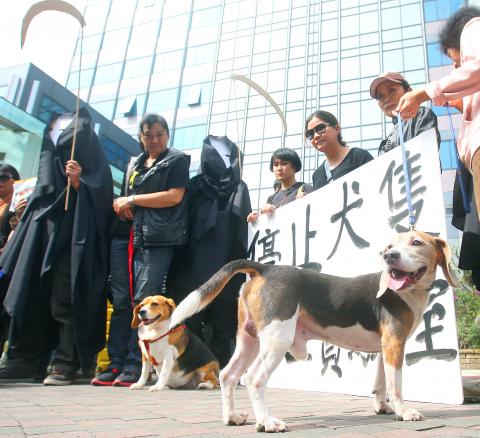Animal rights activists and pet lovers yesterday gathered in front of the Atomic Energy Council (AEC) to protest against the use of beagles in animal experiments.
The group was protesting against toxicity and safety tests for a new drug being developed by the council’s Institute of Nuclear Energy Research (INER) that are being carried out on beagles.
Holding up a banner reading “Protest against animal abuse! The AEC disregards life!” and accompanied by 10 beagles, the group of about 30 protesters urged the council to stop testing new drugs on animals.

Photo: CNA
Animal rights advocate Huang Tai-shan (黃泰山) said the council made a worldwide call for bids on the Internet earlier this month for 40 beagles to conduct drug tests.
The council is asking for beagles who have cancer, Huang said, adding that the council dissects some of the dogs on the second day after being injected with an experimental drug and that more are dissected on the 15th day of the testing.
“The lucky ones that survive the experiment are sent to other research centers for other experiments until they die,” he said.
The council denied asking for cancerous dogs, saying that the beagles imported are healthy dogs.
Wang Hsiao-hua (王小華), a member of the Kaohsiung Concern Stray Animal Association, said the beagles that were experimented on were just like any other pet beagle, and experienced fear and pain during the tests.
Many animal experiments to develop drugs have already proven ineffective, so the council should find alternative methods to test drugs, Huang said, adding that they were also strongly against the establishment of a dog radiotoxicological experiment lab at the council, as it would encourage more experiments on dogs.
The protest group submitted a petition to INER deputy director-general Shen Lie-hang (沈立漢), asking the council asking to stop the experiments on beagles.
Shen offered the group a report on the experiments they conducted inside the building.
“We don’t want to hear about the inhumane experiments, we want a clear answer from a higher authority. Life is nonnegotiable!” the protesters shouted, refusing to go inside the building for talks.
Following this, Atomic Energy Council Deputy Minister Chou Yuan-ching (周源卿) met with the protesters and agreed that the council would use official documents to inform the association of the council’s decision on the tests within two weeks.
Shen said the experiments were used to test the safety of a new drug being developed by the institute for treating colon and rectal cancer and that procedures had been carried out according to legal regulations.
Shen said that according to the Department of Health’s Guideline for the Nonclinical Pharmacology/Toxicology Studies for Medicinal Products, testing on rodents and non-rodents is necessary to ensure the safety of medicines on the human body and that the experiments should be monitored by the Institutional Animal Care and Use Committee.
Shen said the use of beagles as non-rodent experimental animals is common in many countries because of their stable gene structure
The council limited the number of dogs used to the fewest possible, Shen added.
According to Council of Agriculture statistics, about 1.52 million animals (including 291 dogs) were used in research experiments in 2009 and about 1.3 million (including 247 dogs) were used last year.

Chinese Nationalist Party (KMT) Chairman Eric Chu (朱立倫), spokeswoman Yang Chih-yu (楊智伃) and Legislator Hsieh Lung-chieh (謝龍介) would be summoned by police for questioning for leading an illegal assembly on Thursday evening last week, Minister of the Interior Liu Shyh-fang (劉世芳) said today. The three KMT officials led an assembly outside the Taipei City Prosecutors’ Office, a restricted area where public assembly is not allowed, protesting the questioning of several KMT staff and searches of KMT headquarters and offices in a recall petition forgery case. Chu, Yang and Hsieh are all suspected of contravening the Assembly and Parade Act (集會遊行法) by holding

PRAISE: Japanese visitor Takashi Kubota said the Taiwanese temple architecture images showcased in the AI Art Gallery were the most impressive displays he saw Taiwan does not have an official pavilion at the World Expo in Osaka, Japan, because of its diplomatic predicament, but the government-backed Tech World pavilion is drawing interest with its unique recreations of works by Taiwanese artists. The pavilion features an artificial intelligence (AI)-based art gallery showcasing works of famous Taiwanese artists from the Japanese colonial period using innovative technologies. Among its main simulated displays are Eastern gouache paintings by Chen Chin (陳進), Lin Yu-shan (林玉山) and Kuo Hsueh-hu (郭雪湖), who were the three young Taiwanese painters selected for the East Asian Painting exhibition in 1927. Gouache is a water-based

Taiwan would welcome the return of Honduras as a diplomatic ally if its next president decides to make such a move, Minister of Foreign Affairs Lin Chia-lung (林佳龍) said yesterday. “Of course, we would welcome Honduras if they want to restore diplomatic ties with Taiwan after their elections,” Lin said at a meeting of the legislature’s Foreign Affairs and National Defense Committee, when asked to comment on statements made by two of the three Honduran presidential candidates during the presidential campaign in the Central American country. Taiwan is paying close attention to the region as a whole in the wake of a

OFF-TARGET: More than 30,000 participants were expected to take part in the Games next month, but only 6,550 foreign and 19,400 Taiwanese athletes have registered Taipei city councilors yesterday blasted the organizers of next month’s World Masters Games over sudden timetable and venue changes, which they said have caused thousands of participants to back out of the international sporting event, among other organizational issues. They also cited visa delays and political interference by China as reasons many foreign athletes are requesting refunds for the event, to be held from May 17 to 30. Jointly organized by the Taipei and New Taipei City governments, the games have been rocked by numerous controversies since preparations began in 2020. Taipei City Councilor Lin Yen-feng (林延鳳) said yesterday that new measures by